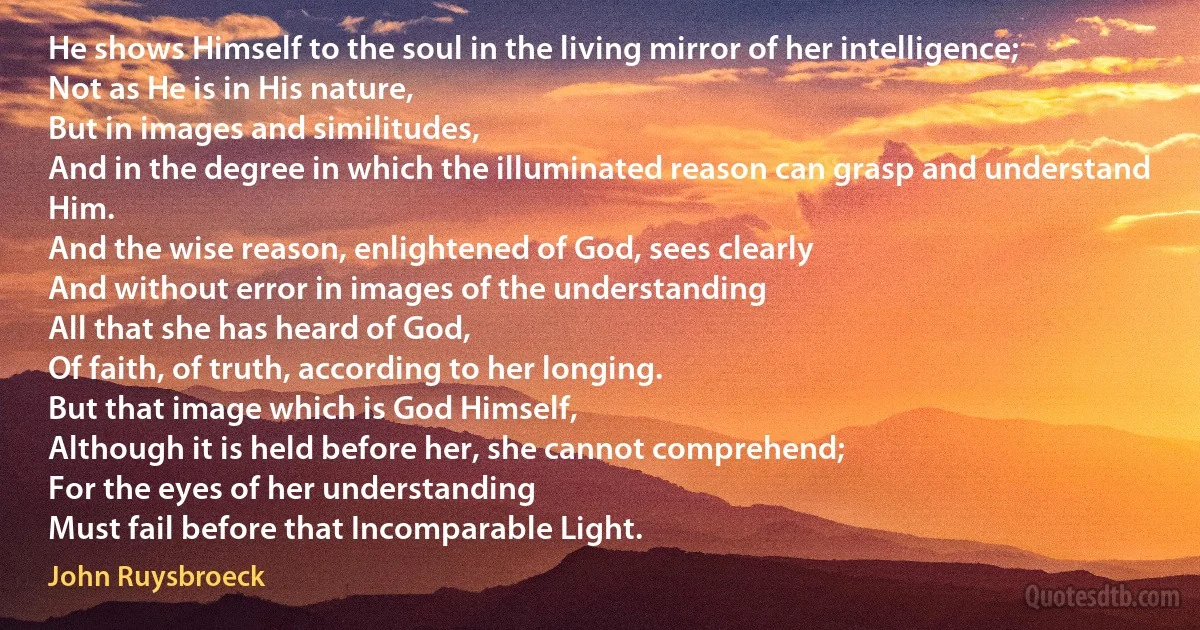
He shows Himself to the soul in the living mirror of her intelligence; Not as He is in His nature, But in images and similitudes, And in the degree in which the illuminated reason can grasp and understand Him. And the wise reason, enlightened of God, sees clearly And without error in images of the understanding All that she has heard of God, Of faith, of truth, according to her longing. But that image which is God Himself, Although it is held before her, she cannot comprehend; For the eyes of her understanding Must fail before that Incomparable Light.
John RuysbroeckRelated topics
degree error fail faith grasp hold incomparable intelligence light living mirror nature reason soul truth understanding wise eyesRelated quotes
Broader and deeper we must write our annals, from an ethical reformation, from an influx of the ever new, ever sanative conscience, if we would trulier express our central and wide-related nature, instead of this old chronology of selfishness and pride to which we have too long lent our eyes. Already that day exists for us, shines in on us at unawares, but the path of science and of letters is not the way into nature. The idiot, the Indian, the child, and unschooled farmer's boy, stand nearer to the light by which nature is to be read, than the dissector or the antiquary.

Ralph Waldo Emerson
When we seek a textbook case for the proper operation of science, the correction of certain error offers far more promise than the establishment of probable truth. Confirmed hunches, of course, are more upbeat than discredited hypotheses. Since the worst traditions of "popular” writing falsely equate instruction with sweetness and light, our promotional literature abounds with insipid tales in the heroic mode, although tough stories of disappointment and loss give deeper insight into a methodology that the celebrated philosopher Karl Popper once labeled as "conjecture and refutation.”.

Stephen Jay Gould
Yet I am not more sure that my soul lives, than I am that perverseness is one of the primitive impulses of the human heart - one of the indivisible primary faculties, or sentiments, which give direction to the character of man. Who has not, a hundred times, found himself committing a vile or a stupid action, for no other reason than because he knows he should not? Have we not a perpetual inclination, in the teeth of our best judgement, to violate that which is Law, merely because we understand it to be such?

Edgar Allan Poe
Spinoza, for example, thought that insight into the essence of reality, into the harmonious structure of the eternal universe, necessarily awakens love for this universe. For him, ethical conduct is entirely determined by such insight into nature, just as our devotion to a person may be determined by insight into his greatness or genius. Fears and petty passions, alien to the great love of the universe, which is logos itself, will vanish, according to Spinoza, once our understanding of reality is deep enough.

Max Horkheimer
You can't remember sex. You can remember the fact of it, and recall the setting, and even the details, but the sex of the sex cannot be remembered, the substantive truth of it, it is by nature self-erasing, you can remember its anatomy and be left with a judgment as to the degree of your liking of it, but whatever it is as a splurge of being, as a loss, as a charge of the conviction of love stopping your heart like your execution, there is no memory of it in the brain, only the deduction that it happened and that time passed, leaving you with a silhouette that you want to fill in again.

E. L. Doctorow
